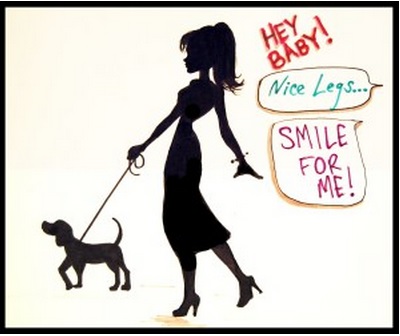By Julie Mastrine
 When I first became a social media volunteer for Stop Street Harassment, curating the Twitter and Facebook feeds for the nonprofit was tricky — I could find very few articles, blog posts, or tweets on the matter. Fast forward to 2 years later, and I can barely keep up with all the stories coming from women and LGBTQ folks exposing this cultural issue. The latest content to go viral is a video of a woman walking around New York City for 10 hours and being harassed more than 100 times.
When I first became a social media volunteer for Stop Street Harassment, curating the Twitter and Facebook feeds for the nonprofit was tricky — I could find very few articles, blog posts, or tweets on the matter. Fast forward to 2 years later, and I can barely keep up with all the stories coming from women and LGBTQ folks exposing this cultural issue. The latest content to go viral is a video of a woman walking around New York City for 10 hours and being harassed more than 100 times.
Women have been taught street harassment is normal or even a compliment, but you can see from the video how sobering these incidents are when taken together over a few hours (now imagine them amassed over a lifetime).
And yet, many people take away a twisted message from calls to end street harassment. They assume ending street harassment means squashing all communication with strangers in public. They think women never want to be approached by people they don’t know. Usually the conversation goes like this:
Me: “We need to work to end street harassment.”
Opponent: “So you’re saying we should never approach anyone in public? What will that do to our communities!?”
This argument is a straw man. Feminists fighting street harassment are not trying to end all public interactions. We are simply asking that public interactions be respectful, mindful of personal space, free of unwanted sexual or objectifying remarks, and mutually desired.
Street harassment is rooted in a need to assert power, objectification of women’s bodies, and entitlement to women’s time and attention. But it is possible to have respectful street interactions — we just have to learn how to distinguish street harassment from street respect.
Street Harassment:
1. Saying (or yelling or shouting) sexual or objectifying comments. Some examples from stories women have submitted to Stop Street Harassment’s blog:
“Show me your tits!”
“Hi babe, would you like to touch my dick?”
“Have you got hair on it yet, love?” (said to a 15-year-old)
“That’s what I like, a woman on her knees.”
“Sluts!”
“Bitch!”
“I like your boobies!”
“Fine ass.”
“Take off your top!”
“Wanna f**k?”
Etcetera. Honestly, the examples of lewd comments go on and on and on.
2. Making sexual or objectifying gestures/disrespecting personal space:
Kissy noises
Following via car, bike or foot
Leering/staring
Pinching/groping
Blocking someone’s path
Taking photos up someone’s skirt or dress
Masturbating in public (do I really have to note this one? Apparently, yes.)
It should be pretty clear these actions and comments are disrespectful. So what constitutes street respect?
If you genuinely just want to make a new friend or are interested in speaking to someone who piques your interest on the street, you can absolutely go about it in a respectful way.
Street Respect:
1. Give compliments (but tread lightly).
* Steer clear of compliments that are actually just objectification of someone’s body or body parts.
* Try complimenting an actual object: “Great dress!” “I love the color of your shoes.” “Where did you get that awesome bag?”
2. Find common ground by asking questions.
* “I’ve read that book and really liked it. Are you enjoying it?”
* “Have you visited the bistro on 11th St.? I might go there for lunch and would love to hear an opinion.”
* “I used to have a beagle just like yours. Is he friendly?”
* “Do you use Lyft? I’m trying to get to Market St. and wondered if it’s worth installing the app.”
* “Can you recommend any good cafés nearby?”
3. Read body language. Take the following gestures to indicate someone is not interested in talking:
* Headphones in
* Walking briskly (like the woman in the aforementioned video!)
* Head down
* Lack of eye contact
* One-word answers
Too many women and LGBTQ folks live in fear of violence after a lifetime of being sexualized and approached aggressively in public. It’s absolutely possible to end street harassment while fostering respectful street interactions. Spread positivity on the streets, and exhibit genuine interest in and respect for those around you — don’t resort to harassing and intimidating others.
[Editor’s Note: Check out more of our resources on this subject.]
Julie Mastrine is a writer and feminist. She is the Social Media Manager at Care2 and is a social media volunteer for Stop Street Harassment. Follow Julie on Twitter and check out her e-book.
